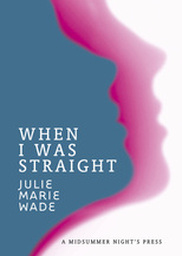Julie Marie Wade’s chapbook When I Was Straight, a title that may lead a reader to expect poems about the transition between sexual identities, is actually largely heterosexually focused. Wade speaks openly about her experiences with men at the start of her sexual awakening, comparing her role as a woman to the ideal feminine condition society preaches, and in contrast to the feelings she had for other women in her life, even before she acted on them. Instead of appealing only to lesbians, the content of Wade’s poetry is extremely relatable for any woman who might not be entirely comfortable in the gender roles society has assigned to her or who is questioning her sexuality. Feminism is not brought up explicitly, but it is an underlying thread that runs throughout the entire work, lending intensity to her emotions and the words she chooses to express herself. The old-fashioned way of looking at how a woman relates to a man still lingers, although women are doing their best to destroy the sad excuses for the lack of progress, as displayed in the helplessness shown in Wade’s poem “There Was a Man in the Moon”: “The woman did not know how to work/the lawnmower, & the man did not know/how to work the microwave.” This presentation of a woman’s skills in the home versus a man’s know-how may have had a seed of truth in it once upon a time, but now women are freer to learn everything they want about the world. Women are also allowed to pursue careers and hobbies rather than just getting married and having children. Wade’s poem “It Was a Shame” brings up what girls are still not taught—how to be a sexual woman, like Wade was while figuring out her sexuality: “It was a shame. It was a phase. / It was a secret. / I wanted every man I met. / I courted danger on the dance floor.” Even before she was thinking about engaging another young lady in bedroom activities, Wade’s perceived promiscuous nature was looked down upon by society in general as unseemly. Girls going through puberty and experiencing hormones and sexual attraction for the first time are understandably confused about what is happening to their bodies and minds during this time and why they want new things, and they must be taught the truth in order to stay healthy.
Julie Wade’s personal and private struggles are mainly caused by the doubt and uncertainty she feels under the eyes of her family as much as the judgment of a stranger finding out her truth. She is not able to be the perfect daughter and so her relationships with her family members deteriorate, as explored by the second half of the book, which consists of more individual reactions to her. In the poem "When My Mother Learns I am a Lesbian" her mother responds, “‘We raised you with God’s laws,’ she says. / ‘We told you to be pure.’ / ‘You raised me to love,’ I say. / ‘You told me to be happy.’” Wade’s honest descriptions and word choice make her feelings very easy to understand through her tone, and so the reader has no doubt at any time how Wade is reacting in turn to the support or disgust of the people in her life. As an entire work, this is not a very cheerful chapbook in that she hides herself from everyone through the first half and after she comes out, the second half is full of disappointments. In “When My College Roommate Learns I am a Lesbian,” even her friend reacts badly: “What are you going to tell your boyfriend?/ Does he already know? / What am I going to tell my boyfriend?” The importance of the revelation is clearly skewed towards what the male opinion of the situation is going to be, which Wade uses to continually reinforce the irony of her sexuality. In “I Thought So Little of Sex,” before she comes out, “Thunder was sex. / Traffic was sex. / Neon was sex.” She is not having sex and so she cannot stop thinking about it and wanting it no matter what, but after she comes out and is presumably having sex with women, she is able to stabilize a little more inside as she simultaneously rocks the world of everyone who thought they knew her well. Wade’s ability to evaluate language for all of its possible meanings and contexts is fascinating, and the rest of her work is similarly thought-provoking and entertaining, regardless of the reader’s sexuality. Wade’s subject matter and manner of writing add gravity to her work and force the reader to take her seriously, along with her themes of feminism and of starting life over to be true to herself.
0 Comments
Leave a Reply. |
Archives
July 2024
Categories
All
|
|
Glassworks is a publication of Rowan University's Master of Arts in Writing 260 Victoria Street • Glassboro, New Jersey 08028 [email protected] |
All Content on this Site (c) 2024 Glassworks
|


 RSS Feed
RSS Feed
